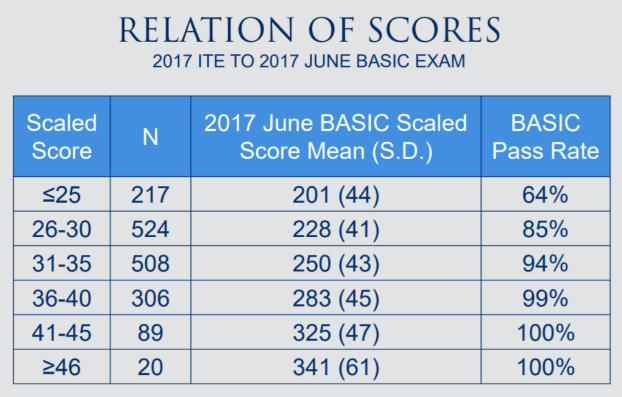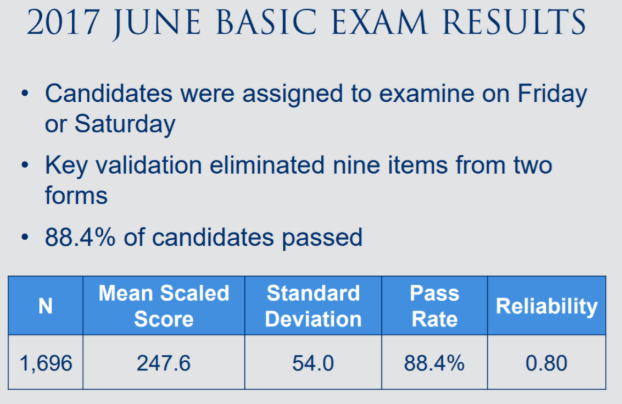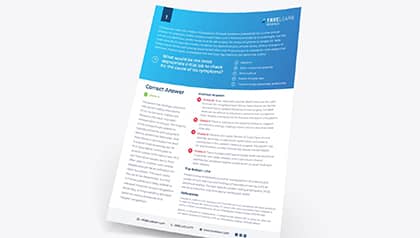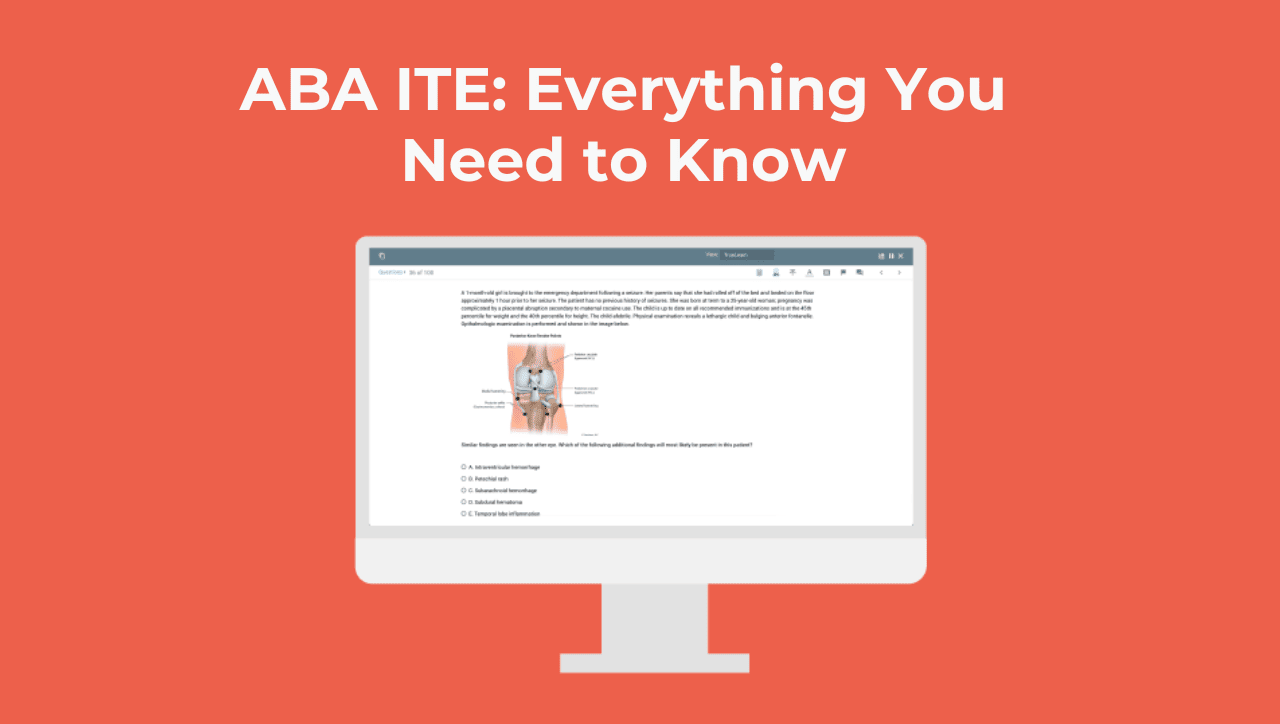ABA BASIC Exam: Everything You Need to Know
The ABA BASIC Exam is part of a staged exam series that starts with the BASIC Exam at the end of CA-1 year anesthesia training. This is followed by the ADVANCED and APPLIED Exams after graduation from anesthesia residency. These staged exams are mandatory as part of the anesthesiology board certification process and for graduation from an anesthesiology residency program.
The main focus of the BASIC exam is to test basic principles in pharmacology, physiology, anatomy, anesthesia equipment and monitoring. Each year, the American Board of Anesthesiology (ABA) releases a “Gaps in Knowledge Report” after the BASIC exam is completed that states the most common topics that were answered as incorrect by examinees or proved to be difficult; these concepts are usually e-mailed directly by the ABA to anesthesiology program directors and may be available upon request.
What is the BASIC Exam
The BASIC Exam is designed to evaluate a CA-1 resident’s mastery of anesthesia learning objectives that are typically covered during the clinical base year and CA-1 year. This is a secure and proctored internet-based exam that is delivered via a vender (e.g. Prometric). The exam takes place either during two days in the summer (usually June) and during two days in the fall (usually November). The specific dates are present on the ABA website.
BASIC Exam Content and Structure
There are four main content categories in the BASIC Exam including “Basic Sciences”, “Clinical Sciences”, “Organ-based Basic and Clinical Sciences”, and “Special Problems or Issues in Anesthesiology”. The questions that comprise these content areas are constructed to cover certain specifications as outlined in the Anesthesia BASIC Exam Blueprint. A typical format will comprise the following:
- “Basic Sciences”: 44-52 questions (24% of exam)
- “Clinical Sciences”: 65-79 questions (36% of exam)
- “Organ-Based Basic and Clinical Sciences”: 66-82 questions (37% of exam)
- “Special Problems Or Issues in Anesthesiology”: 4-8 questions (3% of exam)
There are a total of 200 questions on the exam and residents have four hours to complete this exam. The answer choices are type A question items only. This means that there is only a single-best answer choice on multiple-choice questions and these question stems will not contain negative/exception phrases (e.g. “Which of the following is not true”, “All of the following are correct except for”, etc.). Some BASIC questions may consist of simple recall of facts, while most will require more involved thinking due to second-order or third-order questions. Clinical vignettes accompanied by laboratory data and diagnostic imaging studies may also be presented in questions.
How Long Do I Need to Study for the Exam
It is recommended that residents study long-term over the course of the CA-1 year. Studying an average of one hour daily over the course a year is likely better than cramming 6 hours daily over one month.
Spaced repetition of learning important basic anesthesia concepts is key. There have been numerous published studies that demonstrate the efficacy of spaced repetition in learning and obtaining high board scores across a variety of both medical and non-medical fields. The long-term learning model also allows the resident to practice newly-learned skills from their reading/studying and apply it to their clinical practice earlier on in training. This allows the resident to determine what works best and what does not; this is a form of active learning.
What Type of Results will be Generated
The BASIC Exam is a pass/fail exam and you will not be presented with specific metrics such as scaled score and/or percentile scores. The ABA stated that 90.7% of candidates (1,661 CA-1 residents) taking the BASIC exam in 2016 passed. However, if you do place in the top 10% nationally, your program director will be notified and you will receive a letter from the American Board of Anesthesiology acknowledging and commending you for achieving a BASIC exam score within the Top 10% nationally.
Evidence from Published Studies
A study by Zhou and colleagues analyzed resident performance on the ITE (in-training examination) during implementation of the staged exam system (BASIC, ADVANCED, and APPLIED exams) and compared it to resident performance on the ITE in previous cohorts utilizing the traditional examination system (without the staged BASIC, ADVANCED, and APPLIED exams). This study demonstrated that the new staged system with the BASIC exam had a greater improvement in ITE scores between the first and second years of clinical anesthesiology training. Impressively, the residents in the staged exam cohort achieved a similar score in their second year to that of third-year clinical anesthesiology residents in the previous traditional cohort. This highlights that the new staged system that incorporates the BASIC exam is important for knowledge growth in anesthesiology. Importantly, even though this is a pass/fail examination, residents should view it as an opportunity to prepare to the best of their ability as it is a predictor of ITE performance.
Top 3 Things You Need to Know If You’re Taking the BASIC Exam
1. Long-term preparation is key
You have been preparing for this exam all of CA-1 year. However, it is crucial that the resident employs the proper preparation strategy. Instead of cramming, it is recommended that spaced repetition of study concepts over a long period of time works better. Furthermore, more “active” learning approaches rather than “passive” learning approaches are better. For example, doing questions from a qbank or question book is better than listening to video lectures. Engaging in boards-style questions with your attending is also a useful active learning approach that makes key concepts stick. Another quick tip: it is the opinion of the author of this post that when learning from question banks, it is preferable to do questions in “random” mode than study within one subject at a time. This is how questions will be presented on the actual exam (in random order of subject). In addition, the random order allows for spaced repetition of similar concepts, instead of exposing the resident to the same concepts all at once.
2. Use the appropriate resources:
The resident should focus their efforts on utilizing study tools geared towards basic anesthesia concepts. For example, while studying standard transesophageal echocardiogram views may be useful for the ITE, these advanced topics won’t be tested on the BASIC exam. Utilize the published blueprint on the ABA website to study the pertinent concepts. You will also likely experience resource overload. There are too many anesthesia resources available, try to pick a few reputable sources to focus on. One qbank (e.g. Truelearn BASIC anesthesiology qbank) and one textbook resource (e.g. Morgan and Mikhail’s Clinical Anesthesiology) may be sufficient.
3. Apply for Exam Registration Early:
The registration fee is expensive ranging from $675 to $1,375 based on how early at applicant registers. If the resident applies during standard registration, the fee is generally $875, but late registration fee is $1,375. This is important if the resident’s program does not reimburse for registration fees.
ABA Basic Exam Pass Rate
The ABA has this useful data to guide your likelihood of success: 2017 ABA Exams Report. Pass rates based on your ITE score:

The norms table from the 2018 ITE shows that for CA1s, 31-32 translates into 46-55%ile. Using this information with the data presented in the table above, if your ITE score was average, you fall into the 94% BASIC pass rate. And if you are above average, you have an even higher likelihood of passing.
If you’re curious about overall pass rate for the BASIC exam:

The most important thing to take away from this, is that you probably have good odds of passing, but you shouldn’t neglect the exam altogether. After all, it’s not a 100% pass rate.
What Happens if You Fail the ABA BASIC
If a resident fails the BASIC Exam, they can take it six months later. If the resident fails the exam a second time, he/she will receive an “unsatisfactory” grade during that reporting period and will continue to have that grade until the exam is passed. If the resident continues to fail the BASIC exam three or more times, this will lead to an extension of residency training until the exam is passed.
It’s good to know you have a plan B, and a plan C. But of course it’s better to pass the first time around.
Start Preparing for the ABA Basic with SmartBank
Learn MoreThis blog post was written with the help of Amanda Xi, MD, MSE, current Critical Care Fellow at Massachusetts General Hospital where she also completed her anesthesiology residency. She is active in the American Medical Women’s Association (AMWA) and the Accreditation Council for Graduate Medical Education (ACGME). Amanda is passionate about helping individuals succeed and provides advice through her blog (blog.amandaxi.com) and social media channels (@amandasximd on Instagram and Twitter)
References
- Tabibian B, Upadhyay U, De A, Zarezade A, Schölkopf B, Gomez-Rodriguez M. Enhancing human learning via spaced repetition optimization. Proc Natl Acad Sci U S A. 2019;116(10):3988-3993.
- Feng K, Zhao X, Liu J, et al. Spaced Learning Enhances Episodic Memory by Increasing Neural Pattern Similarity Across Repetitions. J Neurosci. 2019;39(27):5351-5360.
- Zhou Y, Sun H, Lien CA, et al. Effect of the BASIC Examination on Knowledge Acquisition during Anesthesiology Residency. Anesthesiology. 2018;128(4):813-820.
- Augustin M. How to learn effectively in medical school: test yourself, learn actively, and repeat in intervals. Yale J Biol Med. 2014;87(2):207-212.
- Fowler A, Whitehurst K, Al Omran Y, et al. How to study effectively. Int J Surg Oncol (N Y). 2017;2(6):e31.


